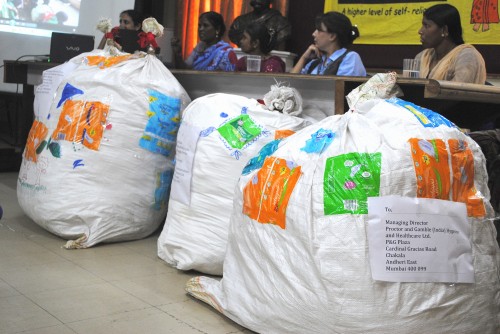Posted by Alliance of Indian Wastepickers
Written by SWaCH
Region Asia-Pacific
Country India
August 05, 2013

Bags full of used sanitary napkins addressed to companies that manufacture the product. Photo credit: SWaCH.
This is a letter to three major manufacturers of sanitary napkins in India. So far, SWaCH has received responses from government leaders but manufacturers have not responded.
By SWaCH
Kimberly-Clark Lever Limited
Post Bag No. 862
Deccan Gymkhana Post Office
Pune 411004 – IndiaSwami Raote, Managing Director, India
Johnson and Johnson Consumer Corporate Communications
30, Forjett Street
Mumbai 400036 – IndiaManaging Director, Proctor and Gamble (india) hygeine and healthcare LTD.
P&G Plaza, Cardinal Gracias Road
Chakala, Andheri East
Mumbai 400099 – IndiaSubject: The issue of sanitary napkin disposal
Dear Sir,
I would like to bring to your attention the issue of Sanitary Napkin Disposal in Pune. A wastepicker organizations has approached us to make the handling of this sanitary waste more humane.
Currently wastepickers have to deal with this waste as part of household waste that they collect and also when they are picking from containers, dumps and landfills. In the recent years the amounts of this waste is also rising rapidly. As you can imagine handling this waste with their bare hands is particularly degrading and can impact the health of women who can have a compromised immune system from malnutrition and hardships. As a citizen I am particularly appalled by this situation.
An organization SWaCH which gives us the service of door step collection, manufactures simple newspaper bags that are easily identifiable. Wastepickers have reported that this has definitely helped.
We know that the responsibility of the entire life cycle of a product is placed on the manufacturers who produce these products as part of their Extended Producers’ Responsibility (part of the Plastics Waste managment and handling rules 2011). In this case products like sanitary napkins and diapers.
As part of this responsibility we would like your company to do the following:
- Enclose a bag along with napkin packages to dispose this waste with a clear identifiable mark that wastepickes can be trained to recognize.
- Ultimately move towards making this product either biodegradable or recyclable (currently it is non-recyclable and non biodegradable and can only be sent to landfills)
- You should also increase awareness about how to dispose this waste and extend your interest in women’s health – from users to post consumer waste handlers as well.
Sincerely,
[your name, city, and country here]
Tweet

